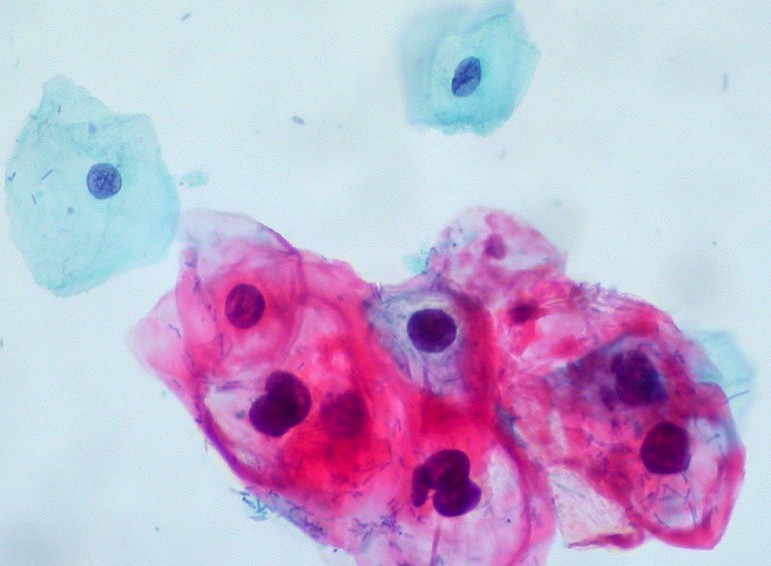
Ed Uthman
The color of HPV: The blue cells are normal. The red cells are infected with the virus.
January is National Cervical Health Awareness Month. This is the perfect opportunity to start 2015 off right and schedule important preventive health care screenings such as Pap tests, which detect irregularities that can lead to cervical cancer.
Cervical cancer is caused by certain types of HPV, or human papillomavirus, a very common sexually transmitted infection. In most cases, the body’s immune system clears HPV naturally— but some types of high-risk HPV may lead to cervical cancer in some people. And while cervical cancer is the most common cancer caused by HPV, this sexually transmitted infection can also cause cancer of the anus, vagina, vulva, penis, and throat. This is an important issue for everyone.
We want to make sure that all New Yorkers know how they can reduce their risk of HPV. As someone who was diagnosed with high-risk HPV in 2014 and as a health care provider at Planned Parenthood of New York City, we know firsthand how important regular screenings and the HPV vaccination are in preventing this sexually transmitted infection—and in fighting cervical cancer.
Here in New York and across the nation, HPV and cervical cancer affect certain groups of people more than others. HPV is particularly dangerous for Black and Latina women—these groups have the highest rates of cervical cancer and are more likely to die from this preventable disease than many other groups. In New York City, Black women are nearly twice as likely to die from cervical cancer, compared with white women. According to the National Cancer Institute, these disparities appear to be caused by a lack of screening and barriers to accessing health care.
Routine Pap tests and the HPV vaccination will go a long way in reducing cervical cancer. However, unless we reduce barriers to health care, particularly the high cost of care, New Yorkers will not be able to protect themselves from cervical cancer and other largely preventable diseases.
Fortunately, as part of the health care law known as “Obamacare,” more Americans have affordable access to the care they need. That includes Pap tests, testing for sexually transmitted infections (STIs), and the HPV vaccine—all which are covered at no cost. Specifically, under this law, most of those who already have insurance will gain access to these and other preventive services such as annual check-ups, mammograms, colonoscopies, blood pressure and diabetes screenings, as well as other vaccines without having to pay a co-pay or deductible.
There’s more good news. Those who are uninsured can enroll in new, more affordable health care plans right now during open enrollment, which ends February 15. Planned Parenthood of New York City (PPNYC) provides in-person help to sign New Yorkers up for affordable health insurance plans (and provides this service year-round for other types health insurance such as Medicaid).
Whether you can obtain health insurance or not, PPNYC will provide you with high-quality, affordable health care—including Pap and STI testing and vaccination. Anyone who has a cervix should have routine Pap tests every three years starting at age 21. And medical guidance recommends that all young people get the HPV vaccination when they are 11 to 12 years old, because the vaccine works best when people receive it years before they start having sex. But even those who have had sex can benefit from the vaccine; it is available to anyone ages 9 to 26.
While there is no cure for HPV, there is treatment for the abnormal cell changes in the cervix that are caused by HPV. Treatment is also available for cervical cancer, which, when caught early, has a 93 percent five-year survival rate.
In addition to screenings and vaccinations, one of the best ways to fight cervical cancer is by talking about HPV and cervical cancer to increase awareness and reduce stigma. So in addition to protecting yourself and reducing your risk, be sure to share this information with your loved ones so they can take charge of their own health in the New Year.








